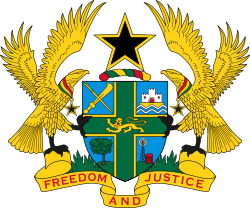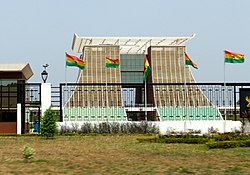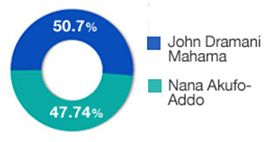Government of Ghana
 Coat of Arms of the Republic of Ghana | |
 Flagstaff House is the official residence and presidential palace. | |
| Government overview | |
|---|---|
| Formed | Founder's Day 67 years, 2 months Republic Day 63 years, 10 months 1992 Constitution 32 years |
| Superseding agency | |
| Jurisdiction | Ghanaian Republic |
| Headquarters | Accra, Greater Accra |
| Government executives | |
| Parent department | Parliament of Ghana |
| Website | www |
The Government of Ghana was created as a parliamentary democracy, followed by alternating military and civilian governments. In January 1993, military government gave way to the Fourth Republic after presidential and parliamentary elections in late 1992. The 1992 constitution divides powers among a president, parliament, cabinet, council of state, and an independent judiciary. The government is elected by universal suffrage.[1]
Government

National Democratic Congress
New Patriotic Party
 |
|---|
| Constitution |
|
|
Political parties became legal in mid-1992 after a ten-year hiatus. There are 20 political parties under the Fourth Republic; the main ones are, the National Democratic Congress, successor to Jerry John Rawlings' original ruling organ Provisional National Defence Council, which has been the incumbent government of Ghana for 32 years between 1981 and 2012;[1] the New Patriotic Party, founded in 1992, which has been the incumbent government of Ghana for 8 years, winning presidential and parliamentary elections in 2000 and 2004, and is successor to the Gold Coast's The Big Six independence achiever party United Gold Coast Convention (UGCC); the People's National Convention, and the Convention People's Party, successor to Kwame Nkrumah's original party of the same name, which was the incumbent government of Ghana for 10 years, from declaration of independence in 1957 to 1966, winning elections in 1956, 1960, and 1965.[1]
Foreign relations

Since independence, Ghana has been devoted to ideals of nonalignment and is a founding member of the non-aligned movement. Ghana favours international and regional political and economic co-operation, and is an active member of the United Nations and the African Union.[2]
Many Ghanaian diplomats and politicians hold positions in international organisations. These include Ghanaian diplomat and former Secretary-General of the United Nations Kofi Annan, International Criminal Court Judge Akua Kuenyehia, former President Jerry John Rawlings and former President John Agyekum Kuffour who have both served as diplomats of the United Nations.[1]
In September 2010, Ghana's former President John Atta Mills visited China on an official visit. Mills and China's former President Hu Jintao, marked the 50th anniversary of diplomatic ties between the two nations, at the Great Hall of the People on 20 September 2010.[3] China reciprocated with a visit in November 2011, by the Vice-Chairman of the Standing Committee of the National People's Congress of China, Zhou Tienong who visited Ghana and met with Ghana's President John Dramani Mahama.[4]
Judicial system
The legal system is based on British common law, customary (traditional) law, and the 1992 constitution. Court hierarchy consists of Supreme Court of Ghana (highest court), courts of appeal, and high courts of justice. Beneath these bodies are circuit, magisterial, and traditional courts. Extrajudicial institutions include public tribunals.[1] Since independence, courts are relatively independent; this independence continues under the Republic. Lower courts are being redefined and reorganised under the Republic.[1]
Administrative divisions
There are ten administrative regions of the Republic of Ghana which are divided into 6 metropolitan assemblies; 55 Municipal assemblies; and 216 districts,[5] each with its own district assembly.[5] Below districts are various types of councils, including 58 town or area councils; 108 zonal councils; and 626 area councils.[5] Sixteen thousand unit committees exist on the lowest level.[1] Ghana has 275 electoral constituencies.[5]
Parliamentary Constituencies of Ghana
See also
References
- ^ a b c d e f g "Government and Politics". A Country Study: Ghana (La Verle Berry, editor). Library of Congress Federal Research Division (November 1994). This article incorporates text from this source, which is in the public domain. Lcweb2.loc.gov.
- ^ "Official page of Nations Permanent Mission of Ghana to the United Nations". Author: un.int. United Nations. 20 September 2011. Retrieved 20 May 2012.
- ^ "Hu Jintao Holds Talks with President of Ghana Mills". Author: fmprc.gov.cn. Ministry of Foreign Affairs of the People's Republic of China. 20 September 2010. Retrieved 4 January 2012.
- ^ Deng, Shasha (12 November 2011). "Visiting senior Chinese official lauds Ghana for political stability, national unity". Xinhua. Retrieved 13 November 2011.
- ^ a b c d "Ghana at a glance". ghana.gov.gh. Government of Ghana. Retrieved 1 June 2013.
